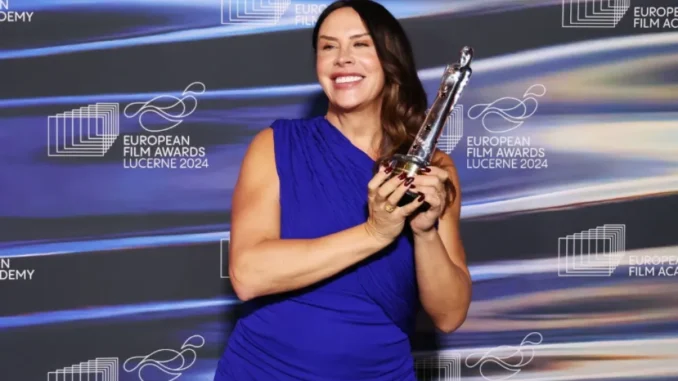
Alyssa VanPelt-Cathcart, Staff Writer
The Oscars are making history with their nomination of Karla Sofía Gascón for the Best Performance by an Actress in a Leading Role. Gascón played the role of Emilia in the Netflix musical Emilia Pérez. Emilia Pérez, according to IMDb, “follows three remarkable women in Mexico, each pursuing their own happiness.” The character Emilia hires the lawyer Rita to help her fake her own death so she may live a more authentic life.
Gascón was born in Spain but worked in many Mexican telenovelas. She came out as transgender in 2016. According to the New York Times, she told them last year, “When I finished my transition, I didn’t know if I was going to have a career after that.” Gascón’s character, Emilia, undergoes transitioning from a man to woman as well. Apparently, director, Jacques Audiard, wanted to cast a cisgender man to play the pre-transitioned Emilia. Jacques Audiard is a French director who has worked on other projects such as The Sisters Brothers and The Bureau. However, Gascón insisted on playing both parts and told The Times, “I can tell you that from an egocentric point of view, I’m mad that people don’t realize it’s me playing both, but at the same time, I feel very proud, too.”
Furthermore, in The Times article featuring Gascón, it is understood that Gascón is the first actress to be nominated for an Oscar who is openly trans. Additionally, if she wins, she will be the first trans actress to win who has played the role of a trans character.
Opinion writer for the New York Times, Jessica Grose, wrote in her article, “The Oscar Nominations Are a Sign Hollywood Still Wants to Counter Conservative Cultural Vibes” Although this is an opinion article, Grose makes some insightful points using the Oscar nominations as her basis. Grose suspects that the nomination for Bowen Yand and Rachel Sennott would provide a “rebuke to the bro-y, conservative vibe shift we’re all living through.” Furthermore, Grose notes, “Yang and Sennott came up through independent comedy and podcasting in New York something that Sennott quipped about during their presentation: ‘For those of you who don’t know, the alt comedy scene is sort of like regular comedy but for women and gay people.’” Another example Grose states is Sebastian Stan and Jeremy Strong’s nominations as best actor and best supporting actor, respectively, for their performances in “The Apprentice.” The Apprentice is a Trump biopic that Trump had “threatened to sue to block the release” according to Grose. However, to connect this back to Gascón, Grose finds it to be such a rebuttal to this conservative wave by having “the first openly trans person to be nominated, for ‘Emilia Pérez,’ the same week Trump signed an executive order stating, ‘Women are biologically female, and men are biologically male.””
Grose uses excellent examples to support her theory that Hollywood is using their Oscar nominations to send a message. However, Gascon is not making a huge deal on being the first openly trans actress to receive a nomination. She said to The New York Times, “Other people are thinking, ‘Wow, this is a special moment, you must be very nervous or very excited. ’No, I am normal. I prefer it that way.”
Leave a Reply